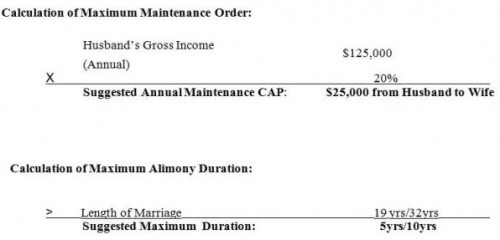Dallas Fathers Rights Attorneys
Are you needing a Dallas fathers rights attorney? Attorneys Mark Nacol and Julian Nacol, with the Nacol Law Firm P.C., provide legal counsel and representation to help you protect your rights as a father.
Are you a father or husband involved with pending divorce, paternity, modifications, property and asset division, child custody, child support or visitation issues? Perhaps you have issues involving parental alienation, false allegations of abuse or false paternity claims.
It is important for you to know your legal rights as a father!
Call our Dallas fathers rights attorneys, Mark Nacol and Julian Nacol, for a consultation today.
The Nacol Law Firm PC
8144 Walnut Hill Lane
Suite 1190
Dallas, Texas 75231
Metro: 972-690-3333
Toll Free: 866-352-5240
Texas Divorce Spousal Maintenance Calculator
Texas is one of the most restrictive states when it comes to ordering spousal support; or “maintenance” as it is defined in the Texas statute. Texas House Bill 901 changing the spousal maintenance law in the Texas Family Code became effective for divorce cases on September 1, 2011. The bill revised the conditions that establish eligibility for spousal maintenance, commonly referred to as alimony and changed the factors required to be considered by a court in determining the nature, amount, duration, and manner of periodic payments for a spouse who is eligible to receive maintenance.
The court that determines a spouse is eligible to receive maintenance shall determine the nature, amount, duration, and manner of periodic payments by considering all relevant factors, including:
(1) each spouse’s ability to provide for that spouse’s minimum reasonable needs independently, considering that spouse’s financial resources on dissolution of the marriage;
(2) the education and employment skills of the spouses, the time necessary to acquire sufficient education or training to enable the spouse seeking maintenance to earn sufficient income, and the availability and feasibility of that education or training;
(3) the duration of the marriage;
(4) the age, employment history, earning ability, and physical and emotional condition of the spouse seeking maintenance;
(5) the effect on each spouse’s ability to provide for that spouse’s minimum reasonable needs while providing periodic child support payments or maintenance, if applicable;
(6) acts by either spouse resulting in excessive or abnormal expenditures or destruction, concealment, or fraudulent disposition of community property, joint tenancy, or other property held in common;
(7) the contribution by one spouse to the education, training, or increased earning power of the other spouse;
(8) the property brought to the marriage by either spouse;
(9) the contribution of a spouse as homemaker;
(10) Marital misconduct, including adultery and cruel treatment, by either spouse during the marriage; and
(11) Any history or pattern of family violence, as defined by Section 71.004 of the Texas Family Code.
The maximum amount of spousal support that courts may award is the lesser of $5,000.00 per month or 20 percent of the payer’s average gross monthly income. This is the maximum amount of maintenance the court orders.
However, in all circumstances, the law provides that the Court shall order maintenance for the shortest reasonable period that allows the recipient to earn sufficient income to meet his or her “minimum reasonable needs” and as follows:
The Texas law mandates the maximum duration of support as follows:
Maintenance shall be paid for a maximum of:
• 5 years, if due to family violence conviction and marriage is under 10 years;
• 5 years, if marriage is between 10 and 20 years;
• 7 years, if marriage is between 20 and 30 years;
• 10 years, if marriage is 30 years or more;
except in the case of an incapacitating physical or mental disability, in which case the award may last as long as the disability.
In addition, the law allows the Texas Family Law Courts to terminate maintenance if the recipient “cohabits with another person in a permanent place of abode on a continuing, conjugal basis.”
Sample Calculation of Texas Spousal Support Maintenance:

Going Through a Divorce with A “Special Needs” Child in Texas
Going through a divorce can be a difficult time for all family members, including the children. The stress of dealing with a child that has a serious illness or difficulty prior to the initiation of a divorce may accelerate during the divorce process. We call such a child the “Special Needs Child”. This child has apparent or diagnosed emotional/medical problems.
Special Needs children are seriously impacted by the decisions made during a divorce. Many times the child becomes more vulnerable not knowing with is happening but very afraid of losing mom or dad forever and causing additional emotional and behavioral problems at home. It is important for parties to determine how meaningful regular visitation will be accomplished and which parent will have the right to make major decisions on how to address the child’s emotional and medical needs. During a divorce, most parents have difficulty agreeing on issues, especially issues related to the problems associated with a “special needs” child.
I. Child with Emotional Issues:
Children will always experience some level of negative emotions during the divorce process, even in the best circumstances. When a child has a mental illness or emotional problem, how visitation periods are managed, who has the authority to make a decision on medical treatment and therapy and how such decisions will be followed and enforced in each parent’s household will greatly affect the success or failure of the final decree as it pertains to the child. It is very important to have an order that is flexible and meets the child’s changing needs, yet remains enforceable should action need to be taken due to a parent’s failure to meet the needs or comply with the court’s order.
Three of the most reported emotional and behavioral issues involving children are Attention Deficit Hyperactivity Disorder (ADHD) Behavioral or Conduct Disorders, Oppositional Defiant Disorder (ODD), and chemical addictions.
2. Special Medical Needs
When a child has significant medical health problems or disabilities parents may have very different opinions on who should be the decision maker regarding doctors, medications and regimens for a particular situation. This may be compounded by the emotions and breakdown in the marital relationship often caused by the stress and differing opinions of the parents on the care of the child. The Court must help to balance the needs and rights of the parents so that each has a voice in their child’s treatment decisions. It is also important that the parties along with the Court work for a consistent treatment protocol to meet the child’s medical needs and best interests.
The real battleground in custody cases becomes the allocation of rights and duties between the parties. This is exacerbated when the child involved has emotional or medical needs. Other factors that may compound issues are 1) other children involved and 2) whether they also have special needs. Major problems occur when there are differing views between the parents on how to best treat the problem or a lack of consensus among medical and mental health professionals as to the appropriate protocol for treatment and uncertainty among family courts as to which protocol
to “impose” upon the family.
Texas Courts vary greatly on how each allocates rights and duties, even in joint managing conservatorship situations. In the event the parties cannot agree on the allocation of rights pertaining to educational and medical decisions the courts must award custody based on the principle of what is the best interest of the child. The Court will consider many factors in developing a parenting plan including the development status of the child, the child’s temperament, and each child’s specific needs.
To make a meaningful decision on the care of the child, the court will need evidence of the following:
• Which parent is the most involved in the decision making as pertains to the relevant issue?
• What are the competing theories of how to best treat the child?
• Current opinions from the child’s physician and /or therapist.
• What is the generally accepted treatment for the specific condition?
• What is the likelihood of each parent following the protocol selected by the court?
• How successful has the treatment been in the past?
• What are the attitudes of the parents in relation to considering alternative methods if the current situation doesn’t work?
• Which parent has shown a proven effort at recognizing the child’s needs and working to address them?
The selection of a reputable expert in the particular field in which the child is affected is paramount to a true evaluation of the situation. Not all doctors and therapists are created equal and the expert must be a specialist in working with the child’s specific problem.
After the divorce is concluded, raising a special needs child requires a high degree of collaboration between both parents. This child feels very afraid and doesn’t have to be put in the middle of a parental alienation feud which could cause long term mental and physical scarring for both the child and the parents. Parents, think about your child! Your child didn’t ask for a divorce but they will have to live with the consequences, good or bad, that your decisions leave them!
Texas SB 250 Protective Orders for Stalking Victims
Texas SB250 bill, effective 9/1/2012, provides stalking as grounds for a protective order. All persons who are victims of stalking have the right to a protective order against their stalker without requiring that the alleged stalker first be arrested for the crime. This legislation also eliminates the need for the stalker to be related, have had relations, or children with the victim before a protective order can be placed. Now more victims who have been exposed to cyber bulling attacks or fixations by strangers and feel that they could be subjected to serious bodily injury or death can petition the court for a protective order.
If you are a victim of stalking, find a lawyer who is familiar with the Texas SB250 Stalking Law. The victim can petition the county court in either their or the stalker’s county with an affidavit on the stalking situation.
If the court finds the information in the application for a protective order that there is a definite and present danger of a sexual assault, stalking, or other harm to the victim, the court, without a hearing, may enter a temporary ex parte order for the protection of the victim and other members of the victim’s family or household for a period up to 20 days without notifying the stalker. If the stalker violates the protective order, the victim should immediately call the police who will arrest the stalker for violating the order.
By allowing victims to seek protection from any type of stalker, no matter of relationship, Texas has provided a new layer of protection to their citizens.




